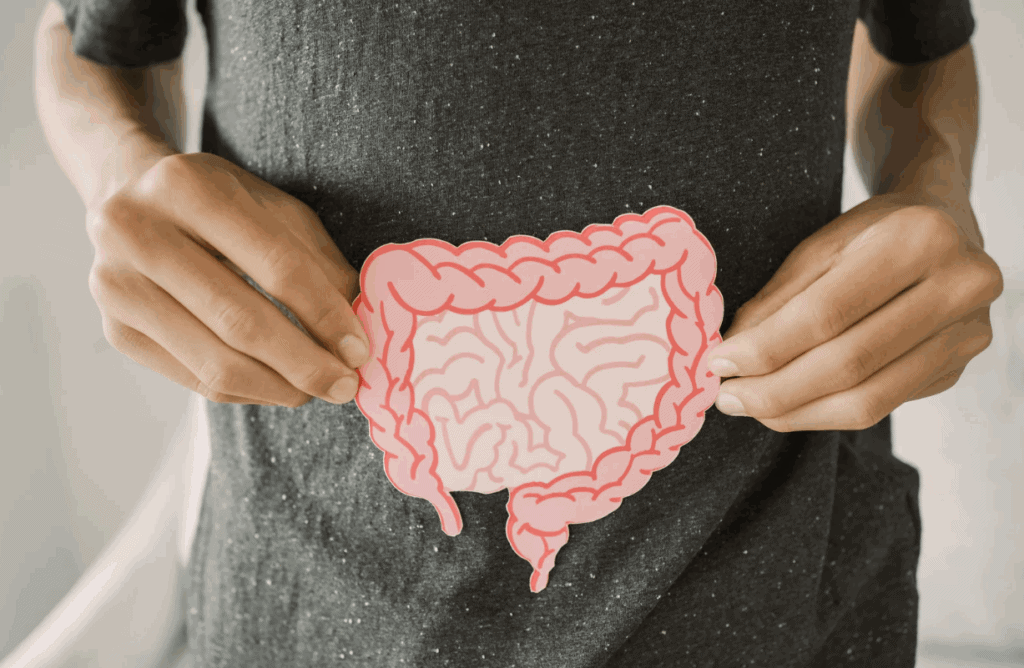If you’ve ever felt heavy, bloated, or uncomfortably full after eating—even when the meal wasn’t that big—you’ve experienced what can happen when digestion doesn’t run smoothly. Your body depends on enzymes for gut to break down the foods you eat into nutrients it can actually use. Without enough of them, even the healthiest diet can leave you feeling sluggish and undernourished.
The good news? With the right support, you can improve digestion, boost nutrient absorption, and reduce discomfort after meals.

What Digestive Enzymes Do
Every time you eat, your body releases enzymes from your mouth, stomach, pancreas, and small intestine to break down carbohydrates, proteins, and fats. For example:
- Amylase turns complex carbohydrates into simple sugars.
- Protease breaks proteins into amino acids.
- Lipase splits fats into fatty acids and glycerol.
- Cellulase helps digest plant fibers for easier elimination.
These processes happen silently in the background—unless something goes wrong.
Why Enzyme Levels Decline
Your pancreas is the main source of digestive enzymes for gut, but its output can decrease for a variety of reasons:
- Aging: Enzyme production naturally declines over time.
- Chronic stress: High stress levels can interfere with digestive function.
- Dietary habits: A lack of raw fruits and vegetables, which naturally contain enzymes, means less support for the digestive process.
- Health conditions: Issues like pancreatic insufficiency, gallbladder removal, or chronic inflammation can impair enzyme production.
When enzyme levels drop, you may notice symptoms like gas, bloating, heartburn, undigested food in stool, or a feeling that food “sits” in your stomach for too long.
The Consequences of Poor Digestion
When food isn’t properly broken down, two big problems occur:
- Nutrient Deficiency
Even if you’re eating nutrient-rich foods, you won’t absorb them efficiently without adequate enzymes. This can lead to fatigue, poor immunity, and slower recovery from illness. - Gut Imbalance
Undigested food can ferment in the intestines, feeding harmful bacteria and causing discomfort, inflammation, or changes in bowel habits.
Over time, these issues can contribute to broader health problems, from skin concerns to weakened immune function.
When Enzyme Support Can Help
Supplemental enzymes for gut can be a game-changer for people who:
- Feel uncomfortably full or bloated after eating
- Experience excessive gas or indigestion
- Have trouble digesting certain foods (dairy, beans, high-fiber vegetables)
- Notice undigested food in their stool
- Have had gallbladder or pancreatic issues

A Targeted Enzyme Blend for Better Digestion
Pancreatic Multi-Enzyme Care offers a carefully balanced mix of plant-based and pancreatic-derived enzymes to support complete digestion. The goal isn’t just to make you feel more comfortable after meals—it’s to help your body fully absorb the vitamins, minerals, and amino acids in your food so you get the most out of every bite.
Because enzymes for gut work at different stages of digestion, a multi-enzyme formula ensures you’re covered whether you’re eating a high-protein meal, enjoying healthy fats, or loading up on fiber-rich vegetables.
Lifestyle Practices to Boost Enzyme Function
While supplementation can make a big difference, your daily habits also affect how well your enzymes work:
- Chew Thoroughly
Digestion starts in the mouth. Taking time to chew signals your body to release enzymes earlier. - Eat Slowly
Rushing meals can overwhelm your digestive system and reduce enzyme effectiveness. - Incorporate Raw Foods
Fresh fruits like pineapple, papaya, and kiwi naturally contain digestive enzymes. - Manage Stress Before Meals
A few deep breaths before eating can shift your body into “rest and digest” mode. - Stay Hydrated
Water supports enzyme activity and helps transport nutrients throughout the body.
Functional Medicine’s View on Digestion
In functional medicine, poor digestion is often seen as a root cause of other health issues. That’s why functional medicine clinics in Mumbai like Wellfinity often assess enzyme function early in the evaluation process. By restoring proper digestive capacity—through lifestyle changes, dietary adjustments, and targeted supplementation—patients often experience improvements far beyond just fewer digestive complaints.
Supporting the pancreas and digestive enzyme output can also help reduce inflammation, balance the microbiome, and improve overall energy levels.
Signs You Might Need Enzyme Support
You don’t need a formal diagnosis of pancreatic insufficiency to benefit from extra enzyme support. Watch for these common signs:
- Frequent bloating or gas after meals
- Feeling overly full from small portions
- Floating or greasy stools
- Cramping or discomfort after eating
- Nutrient deficiency symptoms despite a healthy diet
If these sound familiar, your digestion might need some extra help.
A Simple Addition with Big Impact
Adding a quality multi-enzyme supplement to your daily routine is an easy way to enhance digestion without drastically changing your diet. By helping your body break down food more completely, you not only reduce discomfort—you also maximize the nutritional value of every meal.
For many, this small change results in less bloating, steadier energy, and better overall well-being. It’s a reminder that sometimes the most powerful wellness shifts start with the basics: how well you digest what you eat, as per integrative and functional medicine experts like Wellfinity.
The bottom line:
Good digestion is the gateway to good health. By supporting enzyme activity—whether through diet, mindful eating, or targeted supplementation like Pancreatic Multi-Enzyme Care—you give your body the tools it needs to extract maximum benefit from every meal.


